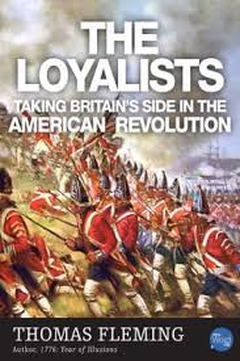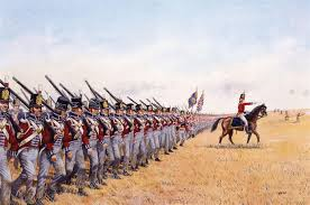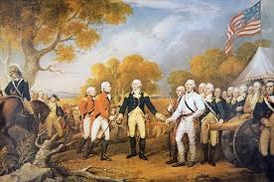 American loyalists to King George American loyalists to King George The conflict was the synthesis of emerging optimism respecting the possibility that reason can control human life. Cogito ergo sum. I think, therefore I am. The 18th century Enlightenment was the culmination of ideas born before and mainly in the 17th century with John Locke, Thomas Hobbes et al when philosophical thought expanded and advanced into a social contract, instead of religious dogma as central to the formulation of policies and laws. It’s a doctrine arguing the right of people to change conditions of obligation and dependency. A social contract is not unilateral; rather, there are obligations on all sides. Failure to fulfill the social contract, it becomes incumbent upon human beings (archaic language uses “men”) to alter and reconstitute the contract. To best describe both the English and American perspective, this writer will refer to Professor Stanley Weintraub historian, biographer and author of “Iron Tears: America's Battle for Freedom, Britain's Quagmire, 1775-1783." Perspectives will be gathered from various sources including book reviews and an interview on NPR with Professor Weintraub and historical references. One perspective observed that the American Revolution was Britain’s Vietnam mainly because the cost in treasure and lives did not achieve victory—the kind of victory King George III wanted, which was subjugation of the colonies as dependent and indebted to the crown. Did the Americans win the war, or did the British fail to gather the home support to defeat the colonists? King George perceived the colonists as traitors to the crown, but parliament did not totally share his enthusiasm. By 1780 the war was taking its toll and becoming ever more costly, and the British hired foreign mercenaries in some cases to fight who ultimately deserted. Additionally, some American loyalists to the crown were not that loyal and decided against turning their coats to red. On the home front taxes were rising and foreign trade was diminishing, which resulted in increased unemployment. Clearly all was not copacetic in parliament and blame was in the offing. The war was perceived in both houses of parliament as unwinnable for a host of reasons.  British linear battle tactic British linear battle tactic One of the reasons was the tremendous number of casualties suffered by the British as they attempted to fight against a new kind of warfare: guerilla warfare. American militias called minutemen were ever ready to respond whenever brightly red-coated British regulars, who marched across the battlefield in linear formation assembled themselves as easy targets. Colonists trained in rapid loading and firing proved superior to the British who were armed with inaccurate smoothbore muskets. Baron Friedrich von Steuben joined George Washington’s regulars rewrote the British manual of arms and created a new manual and drilled the Continental forces relentlessly. They learned to load and fire four rounds a minute under his direction improving battlefield success and maneuverability. To picture this rapid fire method, Brits might know of the BBC TV series “Sharpe’s Rifles” where then Sergeant Sharpe teaches his brigade of “95th Rifles” in one episode to load and fire four rounds a minute. It takes skill and a lot of practice. By the end of the Napoleonic wars (1799-1815), Sharpe became Lieutenant-Colonel as a reward for his unit’s valor. No doubt, the British had learned about rapid-fire from their skirmish across the pond a few decades before challenging Napoleon. Historically losing wars waged abroad does not garner support in the home country, and maintaining support for the war becomes increasing difficult as the US experienced in Vietnam and more recently Afghanistan. The British people did not have an appetite for continuing a costly war with the colonists. When the French entered the war after British General Burgoyne’s capitulation (surrender), the English/American war became international with old enemies taking the opportunity to fight England, further alienating an already war-weary British population. France, Spain and the Netherlands, felt sufficiently encouraged to support the American rebels, contributing soldiers, ships and, in the case of the Dutch, almost unlimited funding to the cause. International efforts reached a peak in 1781, when Cornwallis was trapped at Yorktown called the Franco-American victory. It was a French fleet that prevented supplies reaching Cornwallis, and the army that besieged him, though led by Washington, consisted of mainly French troops. Wars are waged and fought from the home front as much as on the battlefield in democratic-leaning countries. Without ideological support of the civilian population, securing economic support and impetus to send loved ones into harm’s way is an exercise in futility and doomed to fail. Part 2 American perspective Friday July 3, 2015 Resources NPR Stanely Weintraub at Amazon - an American writer History Foundation America
7 Comments
Eileen
2/7/2015 05:48:09 am
Hi Dava I will read it properly later on when it is less hot!
Reply
B. McPherson
2/7/2015 12:01:48 pm
The Canadian perspective is a little different as well. King George III was mentally ill yet stayed in power. The English were just coming off a costly war with France, which prevented the Canadian colonies(French at the time) and the French colony of Louisiana from pushing the English colonies off the continent. When victory was reached and taxes were imposed to help pay for the war some American colonists refused to pay up. Hostilities between the Canadian colonies and the American continued for many years as the boundaries were not fixed and the Americans looked to seize more territory. The War of 1812 was important. That was when the American White House was burned to the ground. An uneasy truce followed but was stirred again by President Teddy Roosevelt who tried to turn public opinion to a takeover war to annex all of Canada up to the 54th parallel. His theme was "54'40" or fight". Most Canadians love our American neighbours, but as Robert Frost said -- Good fences make good neigbours.
Reply
eileen
2/7/2015 12:43:09 pm
I think Julia was spot on in her opinion piece about the confederate flag when she noted how her education about the American civil war was only from an American viewpoint.
Reply
Dava Castillo
2/7/2015 03:04:11 pm
Thank you for reading and commenting Eileen.
Eileen
4/7/2015 03:22:41 am
But noting the native Americans may have come from elsewhere sometime in history does not mean it was not their country. It was and remains that way-the Englsh had a hand in that one of course too
Dava Castillo
2/7/2015 02:55:06 pm
Thank you for reading and commenting on the Canadian perspective.
Reply
Dava Castillo
2/7/2015 03:40:07 pm
Thank you for reading and commenting on the Canadian perspective Barbara.
Reply
Leave a Reply. |
Dava Castillo
is retired and lives in Clearlake, California. She has three grown
children and one grandson and a Bachelor’s degree in Health Services
Administration from St. Mary’s College in Moraga California. On the
home front Dava enjoys time with her family, reading, gardening, cooking
and sewing. Archives
November 2015
|


